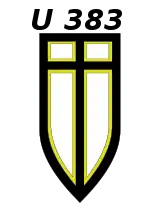German submarine U-383
German submarine U-383 was a Type VIIC U-boat of Nazi Germany's Kriegsmarine during World War II.
| History | |
|---|---|
| Name: | U-383 |
| Ordered: | 15 August 1940 |
| Builder: | Howaldtswerke, Kiel |
| Yard number: | 14 |
| Laid down: | 29 March 1941 |
| Launched: | 22 April 1942 |
| Commissioned: | 6 June 1942 |
| Fate: | Sunk, 1 August 1943[1] |
| Badge: |
 |
| General characteristics | |
| Class and type: | Type VIIC submarine |
| Displacement: |
|
| Length: |
|
| Beam: |
|
| Height: | 9.60 m (31 ft 6 in) |
| Draught: | 4.74 m (15 ft 7 in) |
| Installed power: |
|
| Propulsion: |
|
| Speed: |
|
| Range: | |
| Test depth: |
|
| Complement: | 4 officers, 40–56 enlisted |
| Armament: |
|
| Service record[2][3] | |
| Part of: |
|
| Commanders: |
|
| Operations: |
|
| Victories: | one commercial ship sunk (423 GRT) |
The submarine was laid down on 29 March 1941 at the Howaldtswerke yard at Kiel, launched on 22 April 1942, and commissioned on 6 June under the command of Oberleutnant zur See Horst Kremser.[2]
Design
German Type VIIC submarines were preceded by the shorter Type VIIB submarines. U-383 had a displacement of 769 tonnes (757 long tons) when at the surface and 871 tonnes (857 long tons) while submerged.[4] She had a total length of 67.10 m (220 ft 2 in), a pressure hull length of 50.50 m (165 ft 8 in), a beam of 6.20 m (20 ft 4 in), a height of 9.60 m (31 ft 6 in), and a draught of 4.74 m (15 ft 7 in). The submarine was powered by two Germaniawerft F46 four-stroke, six-cylinder supercharged diesel engines producing a total of 2,800 to 3,200 metric horsepower (2,060 to 2,350 kW; 2,760 to 3,160 shp) for use while surfaced, two Garbe, Lahmeyer & Co. RP 137/c double-acting electric motors producing a total of 750 metric horsepower (550 kW; 740 shp) for use while submerged. She had two shafts and two 1.23 m (4 ft) propellers. The boat was capable of operating at depths of up to 230 metres (750 ft).[4]
The submarine had a maximum surface speed of 17.7 knots (32.8 km/h; 20.4 mph) and a maximum submerged speed of 7.6 knots (14.1 km/h; 8.7 mph).[4] When submerged, the boat could operate for 80 nautical miles (150 km; 92 mi) at 4 knots (7.4 km/h; 4.6 mph); when surfaced, she could travel 8,500 nautical miles (15,700 km; 9,800 mi) at 10 knots (19 km/h; 12 mph). U-383 was fitted with five 53.3 cm (21 in) torpedo tubes (four fitted at the bow and one at the stern), fourteen torpedoes, one 8.8 cm (3.46 in) SK C/35 naval gun, 220 rounds, and a 2 cm (0.79 in) C/30 anti-aircraft gun. The boat had a complement of between forty-four and sixty.[4]
Service history
U-383 served with the 8th U-boat Flotilla for training, and then operationally with the 9th flotilla from 1 October 1942 to 1 August 1943.[2] She completed four patrols in that time, sinking only one ship, the 423 gross register tons (GRT) Icelandic trawler Jon Olafsson on 24 October 1942,[5] during her first patrol.[3]
On the evening of 1 August 1943 U-383 was attacked west of Brittany, at position 47°24′N 12°10′W, by a Short Sunderland of No. 228 Squadron RAF. Responding with flak, the U-boat holed the fuselage and shot away the starboard float and aileron of the aircraft, which pressed home its attack and straddled the U-boat with depth charges before heading back to base. Kremser radioed for assistance, and though three U-boats and three torpedo boats searched during the night and the next day, they failed to locate the crippled U-383 and she was presumed lost.[2]
Wolfpacks
U-383 took part in ten wolfpacks, namely.
- Puma (26–29 October 1942)
- Natter (30 October – 8 November 1942)
- Kreuzotter (8–18 November 1942)
- Habicht (10–19 January 1943)
- Haudegen (19 January – 15 February 1943)
- Sturmbock (23–26 February 1943)
- Amsel (22 April – 3 May 1943)
- Amsel 2 (3–6 May 1943)
- Elbe (7–10 May 1943)
- Elbe 2 (10–14 May 1943)
Summary of raiding history
| Date | Ship Name | Nationality | Displacement | Fate[6] |
|---|---|---|---|---|
| 24 October 1942 | Jon Olafsson | 423 | Sunk |
References
- Kemp 1999, p. 138.
- Helgason, Guðmundur. "The Type VIIC boat U-383". German U-boats of WWII - uboat.net. Retrieved 13 January 2010.
- Helgason, Guðmundur. "War Patrols by German U-boat U-383". German U-boats of WWII - uboat.net. Retrieved 13 January 2010.
- Gröner 1991, pp. 43–46.
- Helgason, Guðmundur. "Jon Olafsson (Steam trawler)". Ships hit by U-boats - uboat.net. Retrieved 13 January 2010.
- Helgason, Guðmundur. "Ships hit by U-383". German U-boats of WWII - uboat.net. Retrieved 26 December 2014.
Bibliography
- Busch, Rainer; Röll, Hans-Joachim (1999). German U-boat commanders of World War II : a biographical dictionary. Translated by Brooks, Geoffrey. London, Annapolis, Md: Greenhill Books, Naval Institute Press. ISBN 1-55750-186-6.
- Busch, Rainer; Röll, Hans-Joachim (1999). Deutsche U-Boot-Verluste von September 1939 bis Mai 1945 [German U-boat losses from September 1939 to May 1945]. Der U-Boot-Krieg (in German). IV. Hamburg, Berlin, Bonn: Mittler. ISBN 3-8132-0514-2.
- Gröner, Erich; Jung, Dieter; Maass, Martin (1991). U-boats and Mine Warfare Vessels. German Warships 1815–1945. 2. Translated by Thomas, Keith; Magowan, Rachel. London: Conway Maritime Press. ISBN 0-85177-593-4.
- Bishop, Chris (2006). Kriegsmarine U-Boats, 1939-45. London: Amber Books. ISBN 978-1-904687-96-2.
- Kemp, Paul (1999). U-Boats Destroyed - German Submarine Losses in the World Wars. London: Arms & Armour. ISBN 1-85409-515-3.
External links
- Helgason, Guðmundur. "The Type VIIC boat U-383". German U-boats of WWII - uboat.net. Retrieved 26 December 2014.